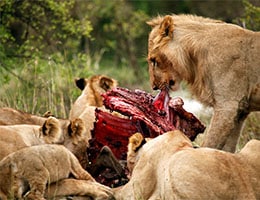 The verb devour has its etymological origin in the Latin word devorāre . When linked to an animal, it refers to the act of eating prey . For example: “The lion soon devoured the zebra,” “If you are easily impressed, I suggest you stop watching this documentary: I think now the tiger is going to devour a small deer,” “The cubs are very fast and do not allow themselves to be easily devoured by their predators.”
The verb devour has its etymological origin in the Latin word devorāre . When linked to an animal, it refers to the act of eating prey . For example: “The lion soon devoured the zebra,” “If you are easily impressed, I suggest you stop watching this documentary: I think now the tiger is going to devour a small deer,” “The cubs are very fast and do not allow themselves to be easily devoured by their predators.”
Animals that sometimes feed on humans are often described as man-eaters . Lions, tigers, sharks and crocodiles are among the species that report the most attacks on people.
Of course, in these cases it usually happens that the human being takes the first step towards his own death when he invades the animal's territory, either to document its life or, worse still, to hunt it . From our point of view, the animals that hunt people are "dangerous", but we should start thinking about the image that those bears, deer, lions and many others that will end up embalmed and displayed as trophies have of us.
The idea of devouring is also used when an individual eats hurriedly and eagerly : “I'm hungry! “I'm going to devour four or five sandwiches,” “When the little one began to eagerly devour the cake, I was surprised,” “Do you have to devour food that way? Better don't rush and chew calmly."
In this context, it can be said that devouring food is one of the worst habits if we seek to lead a healthy and balanced life. The body is not prepared to eat food compulsively; On the contrary, it is recommended to eat in small bites, chew them until they are sufficiently soft or crumbly, depending on the product, and only then swallow them.
Another very useful tip for proper nutrition is to drink water several times throughout the meal, and not leave it until the end. Water often helps us swallow bites easily, and this can prevent them from getting stuck in our throat.
 Devour, on the other hand, can refer to dedicating attention or a lot of time to something, consuming it, using it, destroying it or conquering it, as the case may be: “I think I'm going to devour Stephen King's new novel tonight,” “If “Man continues to act this way, he is going to devour the planet,” “The young singer intends to devour the world.”
Devour, on the other hand, can refer to dedicating attention or a lot of time to something, consuming it, using it, destroying it or conquering it, as the case may be: “I think I'm going to devour Stephen King's new novel tonight,” “If “Man continues to act this way, he is going to devour the planet,” “The young singer intends to devour the world.”
If we look at the first example, it can refer to people classified as "book devourers", a compound term that is not included in the official dictionary of the Royal Spanish Academy although it is used very frequently in everyday speech. This is someone with a special voracity for reading, who may or may not discriminate the books they consume.
Depending on the point of view and the context in which this word is used, it can have a negative or neutral connotation, as we can see in the following examples: «I am a natural book eater, so I can't imagine spending an entire week without reading. something because I always have a book pending» , «With that attitude of devouring books you don't allow yourself to assimilate what you read and that is no way to approach literature» .
The act of crossing a distance at high speed can also be mentioned as devouring: “As we left the city, the traffic slowed down and we began to devour kilometers,” “People in this region usually have 4×4 trucks to devour the dunes of the desert” , “This bike allows me to devour paths of all kinds effortlessly” .
